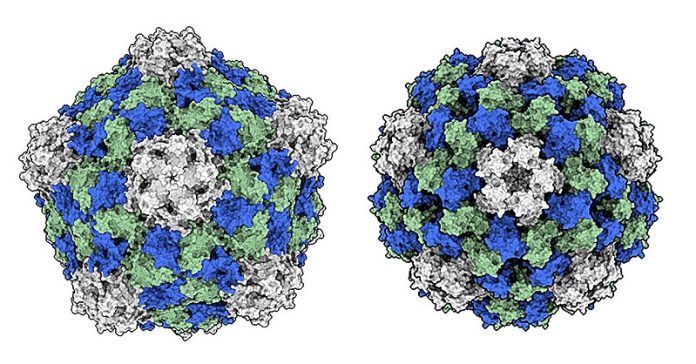
A virus that usually infects black-eyed peas is now showing promise as a powerful, low-cost cancer treatment.
Researchers at the University of California San Diego have discovered how this harmless plant virus can help the body’s immune system target and destroy cancer cells.
Their findings were recently published in Cell Biomaterials.
The virus, called cowpea mosaic virus (CPMV), doesn’t infect human cells—but it does trigger a strong immune response when injected directly into tumors.
In studies involving mice and even pet dogs with cancer, CPMV successfully activated immune cells that attacked tumors and helped prevent the cancer from spreading.
When injected, CPMV attracts immune cells like neutrophils, macrophages, and natural killer cells to the tumor site, where they destroy cancer cells.
It also wakes up B cells and T cells, which are responsible for long-term immune memory.
This means the immune system learns to recognize cancer cells and can fight them off in other parts of the body, not just at the injection site.
Dr. Nicole Steinmetz, the study’s lead researcher, said it’s surprising that CPMV has this effect while other similar plant viruses do not.
To better understand why, the team compared CPMV with a closely related virus called cowpea chlorotic mottle virus (CCMV). Both viruses look alike and are taken up by human immune cells in similar ways, but only CPMV triggers a strong anti-cancer response.
The key difference lies in how CPMV behaves inside human immune cells. Once inside, CPMV activates proteins called interferons, which have long been known to fight cancer. In fact, some early cancer drugs were based on these very proteins.
The other virus, CCMV, only activates a less effective immune response that doesn’t target tumors well.
Another important discovery was how CPMV’s genetic material (RNA) behaves inside cells. CPMV’s RNA stays in the cell longer and reaches a part called the endolysosome, where it activates a sensor known as TLR7. This sensor helps the body detect viruses and triggers a strong defense—one that also helps fight cancer. CCMV’s RNA, however, doesn’t make it to that point.
Beyond its medical promise, CPMV is also easy and inexpensive to produce. It can be grown in plants using just sunlight, soil, and water—unlike many modern cancer treatments that are complex and expensive to make.
The UC San Diego team, along with the National Cancer Institute, is now preparing to move CPMV into clinical trials.
Their goal is to ensure this therapy is safe and effective for people. If successful, this humble plant virus could offer a new, affordable way to treat cancer using the body’s own immune system.
If you care about cancer, please read studies that a low-carb diet could increase overall cancer risk, and vitamin D supplements could strongly reduce cancer death.
For more information about health, please see recent studies about how drinking milk affects the risks of heart disease and cancer and results showing higher intake of dairy foods linked to higher prostate cancer risk.



